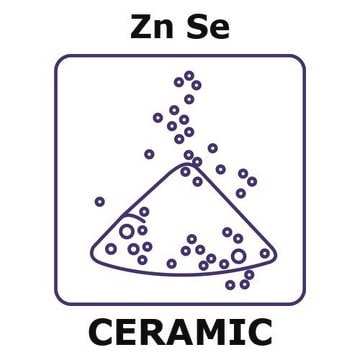244619
Zinc selenide
powder, 10 μm, 99.99% trace metals basis
Sign Into View Organizational & Contract Pricing
All Photos(2)
About This Item
Linear Formula:
ZnSe
CAS Number:
Molecular Weight:
144.35
EC Number:
MDL number:
UNSPSC Code:
12352300
PubChem Substance ID:
NACRES:
NA.23
Recommended Products
grade
deposition grade
Quality Level
Assay
99.99% trace metals basis
form
powder
particle size
10 μm
density
5.42 g/mL at 25 °C (lit.)
application(s)
battery manufacturing
SMILES string
[Zn]=[Se]
InChI
1S/Se.Zn
InChI key
SBIBMFFZSBJNJF-UHFFFAOYSA-N
Looking for similar products? Visit Product Comparison Guide
Related Categories
Signal Word
Danger
Hazard Statements
Precautionary Statements
Hazard Classifications
Acute Tox. 3 Inhalation - Acute Tox. 3 Oral - Aquatic Acute 1 - Aquatic Chronic 1 - STOT RE 2
Storage Class Code
6.1B - Non-combustible acute toxic Cat. 1 and 2 / very toxic hazardous materials
WGK
WGK 3
Flash Point(F)
Not applicable
Flash Point(C)
Not applicable
Personal Protective Equipment
dust mask type N95 (US), Eyeshields, Gloves
Choose from one of the most recent versions:
Already Own This Product?
Find documentation for the products that you have recently purchased in the Document Library.
Customers Also Viewed
Damian W Synnott et al.
Nanotechnology, 24(4), 045704-045704 (2013-01-10)
A novel ambient pressure microwave assisted technique is developed in which silver and indium-modified ZnS is synthesized. The as-prepared ZnS is characterized by x-ray diffraction, UV-vis spectroscopy, x-ray photoelectron spectroscopy and luminescence spectroscopy. This procedure produced crystalline materials with particle
Hyunchul Jung et al.
Journal of nanoscience and nanotechnology, 12(7), 5407-5411 (2012-09-13)
White light-emitting diodes (LEDs) were fabricated using GaN-based 380-nm UV LEDs precoated with the composite of blue-emitting polymer (poly[(9,9-dihexylfluorenyl-2,7-diyl)-alt-co-(2-methoxy-5-{2-ethylhexyloxy)-1 ,4-phenylene)]), yellow green-emitting polymer (poly[(9,9-dioctylfluorenyl-2,7-diyl)-co-(1,4-benzo-{2,1',3}-thiadiazole)]), and 605-nm red-emitting quantum dots (QDs). CdSe cores were obtained by solvothermal route using CdO, Se
Jun Wang et al.
Biosensors & bioelectronics, 41, 143-149 (2012-09-11)
The fluorescence emission intensity of ZnSe quantum dots (QDs) conjugated to proteins to form QD-based biomolecular sensors increases significantly upon binding of the sensors to target proteins in solution. This phenomenon enables the development of homogeneous, separation-free immunoassays for rapid
Evgeni Sorokin et al.
Optics express, 20(27), 28947-28952 (2012-12-25)
We report self-starting femtosecond operation of a 180-MHz SESAM-controlled prismless Cr:ZnS laser around 2400 nm at open air and room temperature. Dispersion compensation was achieved by a combination of bulk materials and chirped mirrors. Both soliton- and chirped-pulse operation regimes
Yunxing Du et al.
Journal of nanoscience and nanotechnology, 12(11), 8487-8493 (2013-02-21)
Nowadays, novel synthesis routes of nanoparticles are attracting a considerable attention of relative scientists. In this work, monodispersed spherical ZnS quantum dots (QDs) were synthesized by an oil-water interface method. The as-prepared products were characterized by X-ray diffraction (XRD), transmission
Our team of scientists has experience in all areas of research including Life Science, Material Science, Chemical Synthesis, Chromatography, Analytical and many others.
Contact Technical Service













![[6,6]-Phenyl C61 butyric acid methyl ester ≥99%](/deepweb/assets/sigmaaldrich/product/structures/359/221/d990c746-0960-4c69-bf76-fe09b193824d/640/d990c746-0960-4c69-bf76-fe09b193824d.png)

